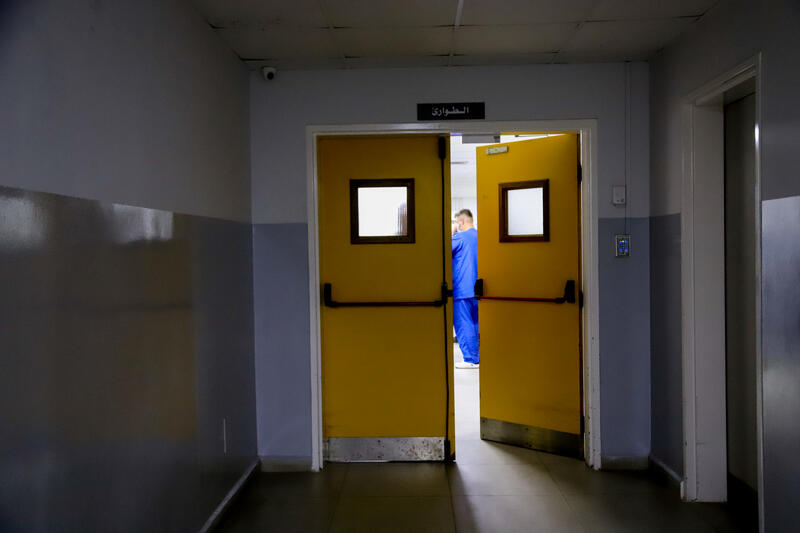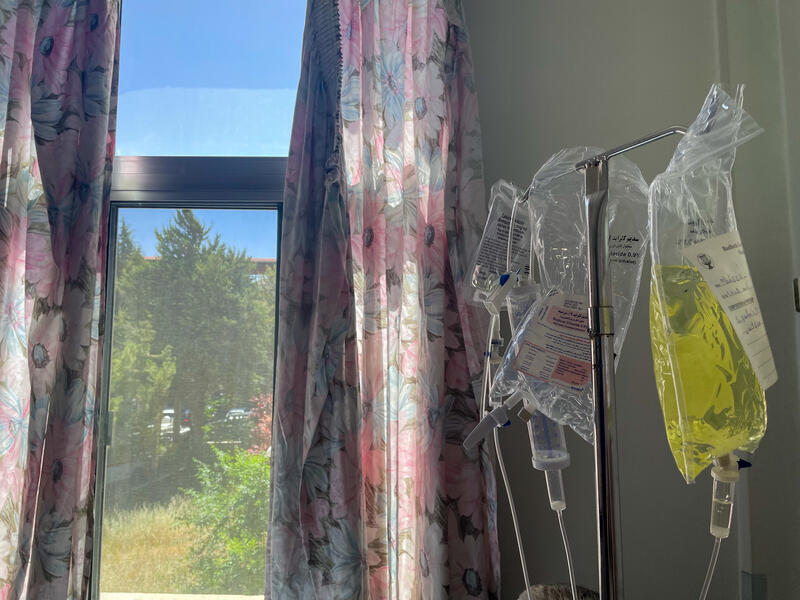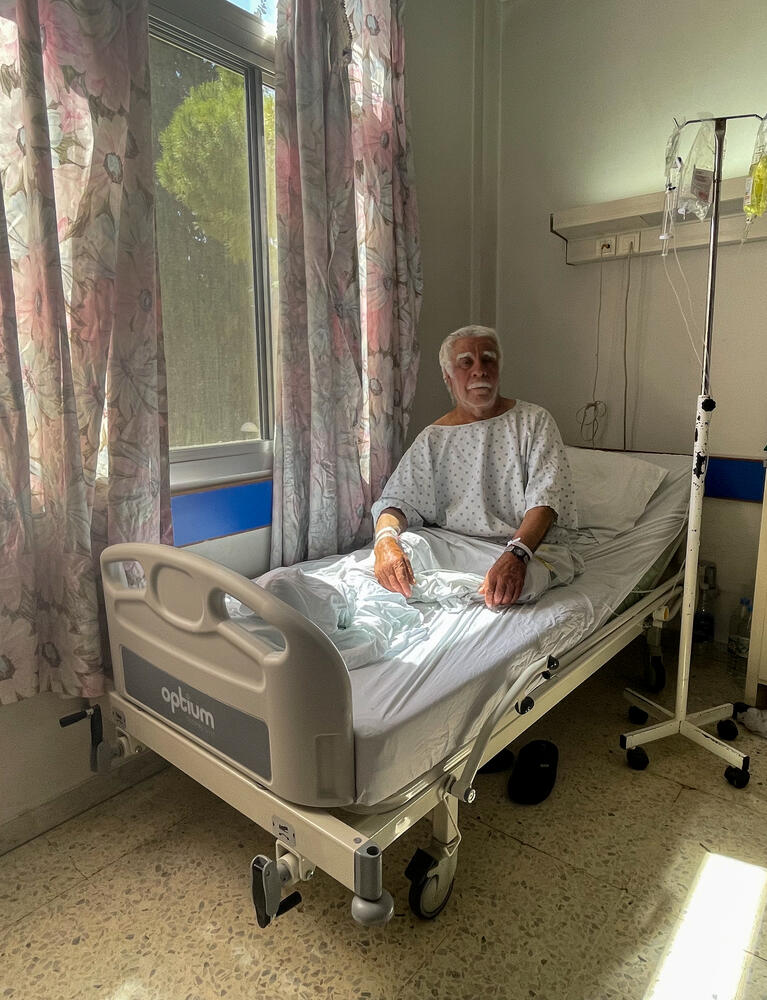“I knew I needed to go to the emergency room when I noticed the rapid change of colour in my toe. But I also knew it would cost me no less than two million Lebanese pounds (LBP),” says Mohammad.
“I can’t afford that – I have no income and my son earns less than 50,000 LBP (Approx 2USD) each day, which we need for food and lodging.”
Today, Mohammad, a 74-year-old Lebanese man with diabetes, is at a clinic in Arsal, in Lebanon’s Bekaa Valley. He is walking unsteadily and stops to catch his breath, leaning against the wall to wipe the sweat off his white hair and frail face.
The clinic is run by Médecins Sans Frontières (MSF) and Mohammed has been a patient here for three years. Over the years, Mohammad has been unable to afford the prescribed diet for his diabetic condition, which further contributed to a deterioration in his health. This ultimately led to the amputation of his left lower limb.

“Mohammad has been part of our clinic for a long time now, we know him very well; the difficulties he faces with his physical health never stopped him from spreading smiles around with his jokes and stories,” says Rabih Kbar, an MSF doctor in Arsal. “However, today he seemed worn out. It felt like he had the worries of the world on his shoulder,” says Kbar.
During Mohammad’s examination, Dr Kbar saw that one of Mohammad’s toes had turned black and required immediate amputation to prevent the infection spreading to the rest of his body. Dr Kbar quickly arranged for him to be admitted to a nearby hospital. Mohammad had been aware of the discoloration of his toe for about two weeks but did not tell anyone as he knew he could not afford the hospital fees.
Economic crisis makes hospital care unaffordable for many

Mohammad was diagnosed with diabetes and hypertension 10 years ago. Juggling different jobs in construction, he was still able to afford medication and treatment for his illness. In the past three years, however, as Lebanon has fallen into economic crisis, he was no longer able to manage the costs and reached out to the MSF clinic in Arsal.
For the past 10 years, MSF teams at the Arsal clinic have provided treatment for chronic diseases, paediatric care, reproductive healthcare and mental health, to fill the gaps in basic health services available in the Bekaa Valley. Recently, our teams have observed an increase in people arriving at the clinic in critical condition and requiring hospitalisation.
“People are coming to our clinics with disorders that have progressed beyond regular management, hoping to find alternative ways to manage their critical conditions without having to go to hospital, so as to avoid the costs,” says Maytham Jary, an MSF referral nurse in the Bekaa Valley.
Lebanon’s ongoing economic crisis has left many people unable to afford hospital care, pushing people to avoid getting timely and appropriate medical treatment. Due to a 90 per cent devaluation of the local currency and spiraling inflation, prices of essential goods have soared, including of medications and medical equipment. This has led to an increase in hospital charges. At the same time, people’s salaries are now worth significantly less, leaving them unable to pay for either hospital care or private insurance to cover medical costs.
Real value of state contributions plummets
Hospital fees in Lebanon used to be covered largely by the country’s National Security Fund (NSSF) or by the Ministry of Public Health (MoPH), depending on a patient’s employment status and medical criteria. This would generally cover 85 to 90 per cent of the costs, with the remainder being paid by the patient. However, with the current economic crisis, the NSSF and the MoPH now cover only a fraction of the actual costs.
“Amid the crisis, the NSSF and MoPH are also struggling financially and have reached their limits,” says Farah Nasser, MSF deputy medical coordinator. “Hospital fees today reflect the new value of the local currency in the market, while the NSSF and MoPH are still providing their payments on the value of currency prior to the crisis, leaving patients with 90 per cent of the actual expense.”
Emigration by health workers threatens quality of care
Even if patients manage to afford hospital fees, specialist health workers are leaving Lebanon in droves, resulting in hospitals without sufficient staff. Since more than 30 per cent of health workers have emigrated, many hospitals have been forced to cut back on services, impacting the quality of care they provide.
“In the past month, a baby born at our birth centre required neurosurgery,” says Maytham. “We spent weeks trying to find a neurosurgeon who was capable and willing to do the surgery, but our options were limited to only two neurosurgeons in the whole country.”
People across Lebanon are facing a serious setback in their ability to access quality hospital care.
About MSF in Lebanon:
MSF is an independent international medical humanitarian organisation providing free healthcare to people in need, without discrimination. MSF first began work in Lebanon in 1976 during the civil war and has been present in the country without interruption since 2008.
MSF is currently providing free medical care for vulnerable communities throughout Lebanon, whether they are Lebanese, refugees or migrant workers. Our teams are present in different locations across the country including Bekaa Valley, Akkar, and South Beirut. Our services include mental health, sexual and reproductive health, paediatric care, vaccinations and treatment for non-communicable diseases, such as diabetes and hypertension. With over 600 staff, we conduct around 150,000 consultations every year in Lebanon.



